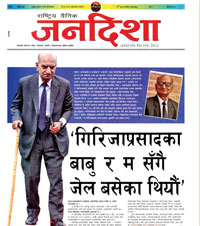 |
I don't think this conflict will last long. Everyone is aware of who stands in what position. However, I do feel that the Maoists' proposal will help guide the discussion in a positive direction.
How far do you think you as president reflect the sentiments of the common people of Nepal?
It is not an easy question to answer. Even if the people had specifically nominated me, I could not be the judge of that. I am a candidate for the presidency and it is up to the people to choose.
To what extent do you think the proposal of your name for the presidency will gain unanimous support?
That will depend on national aspirations. If the people collectively wish for it, then it is possible.
As a person who was born and brought up in the Tarai, what do you think of the idea of 'One Madhes, One State'?
Right now, many such voices can be heard. Decisions regarding such issues will be in the hands of the Constituent Assembly.
There are some who allege that you are not a Madhesi. Why do you think such claims have been made?
I was born and raised in the Tarai. But I have spent most of my life in Kathmandu and India. I lived in several other countries during the period I was exiled from India. Maybe that is why such claims have been made.
On the day you are appointed president, how will you address the nation?
My address as president will be in the name of the common people. The priority of the constituent assembly is to formulate the new constitution. The president's role will be to advise the government in this regard. Among other things, the president will also be required to address the Constituent Assembly. My central focus will be on the need to devise a strong and effective constitution through special dialogues between the political parties and the Maoists.
I am well aware of the delicate nature of the relationship between the government and the president. My knowledge has been enhanced by my experience with regard to Indian politics. I understand that a president needs to have a lot of patience in order to prevent conflict. A constitutional president will need to work within the boundaries drawn by the constitution. The objective is not to contradict the government but to maintain a careful balance of co-operation.
What do you have to say about the view that federalism in Nepal will lead to disintegration?
The country will not disintegrate under any circumstances. It is the duty of the government, the president, the army and everybody else to ensure that the national unity remains intact.
So, will the new Nepal emerge as a powerful nation?
Nepal will emerge as a great nation. Not a greatness measured by population but on the basis of honour and pride. Nepal is a nation with inherent greatness, and thus it will rise.
Do you have something to say to the Nepali people and the political parties?
It would not be appropriate for me to say anything right now. This is not like the American presidential election. I cannot ask for votes. Other parties have the liberty to propose their own candidates and will do so. The future will ultimately depend on what the Nepali people want.


